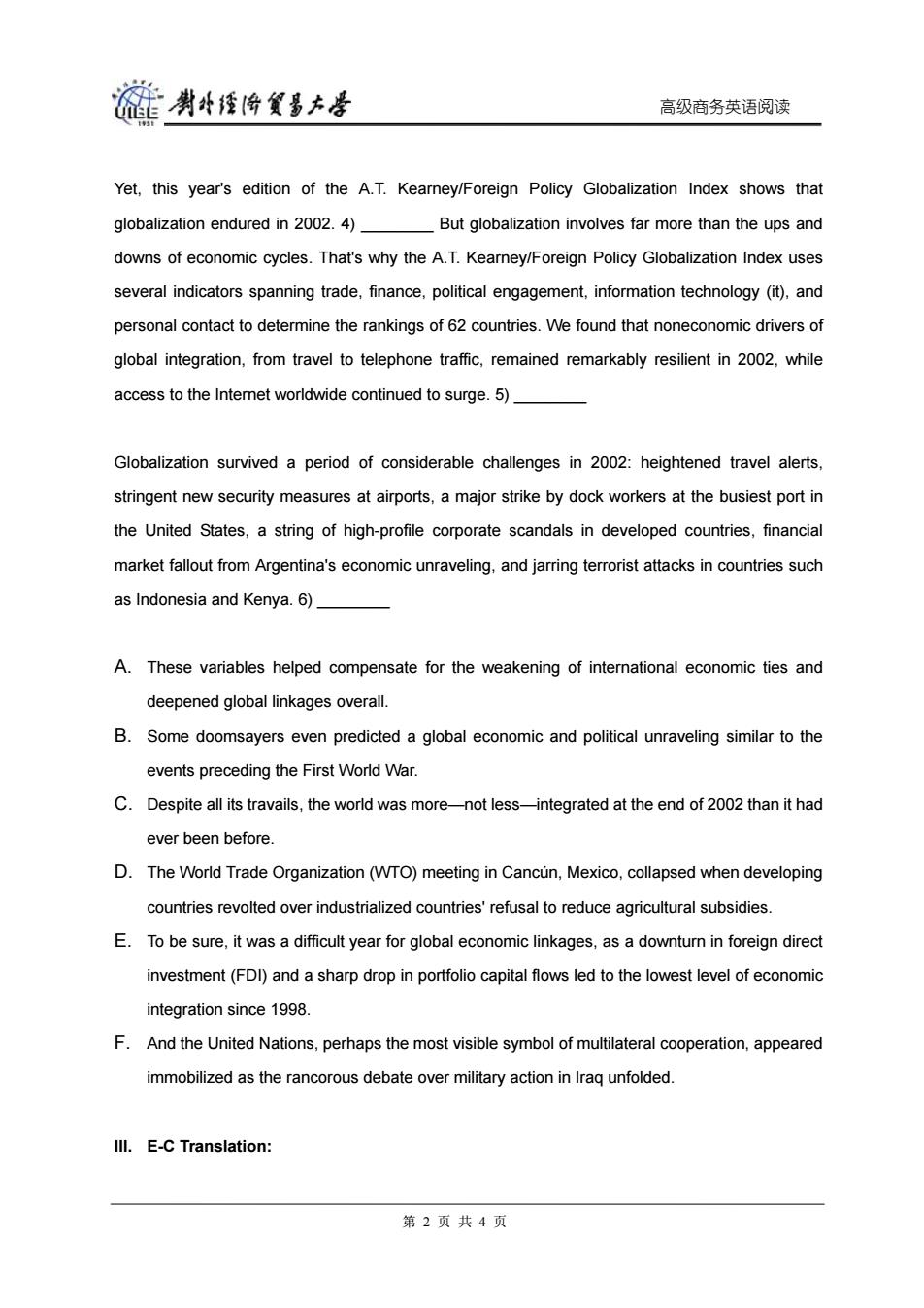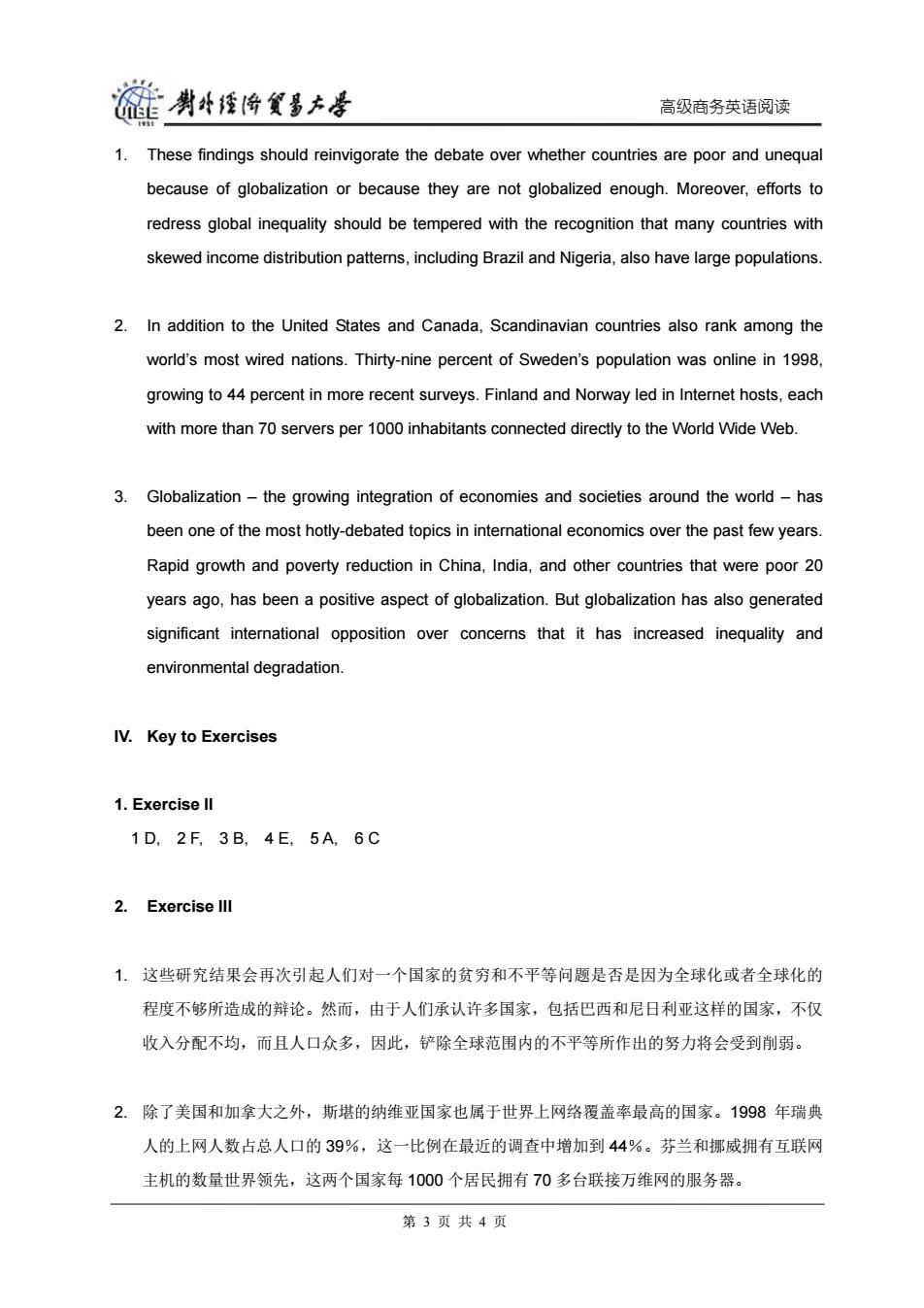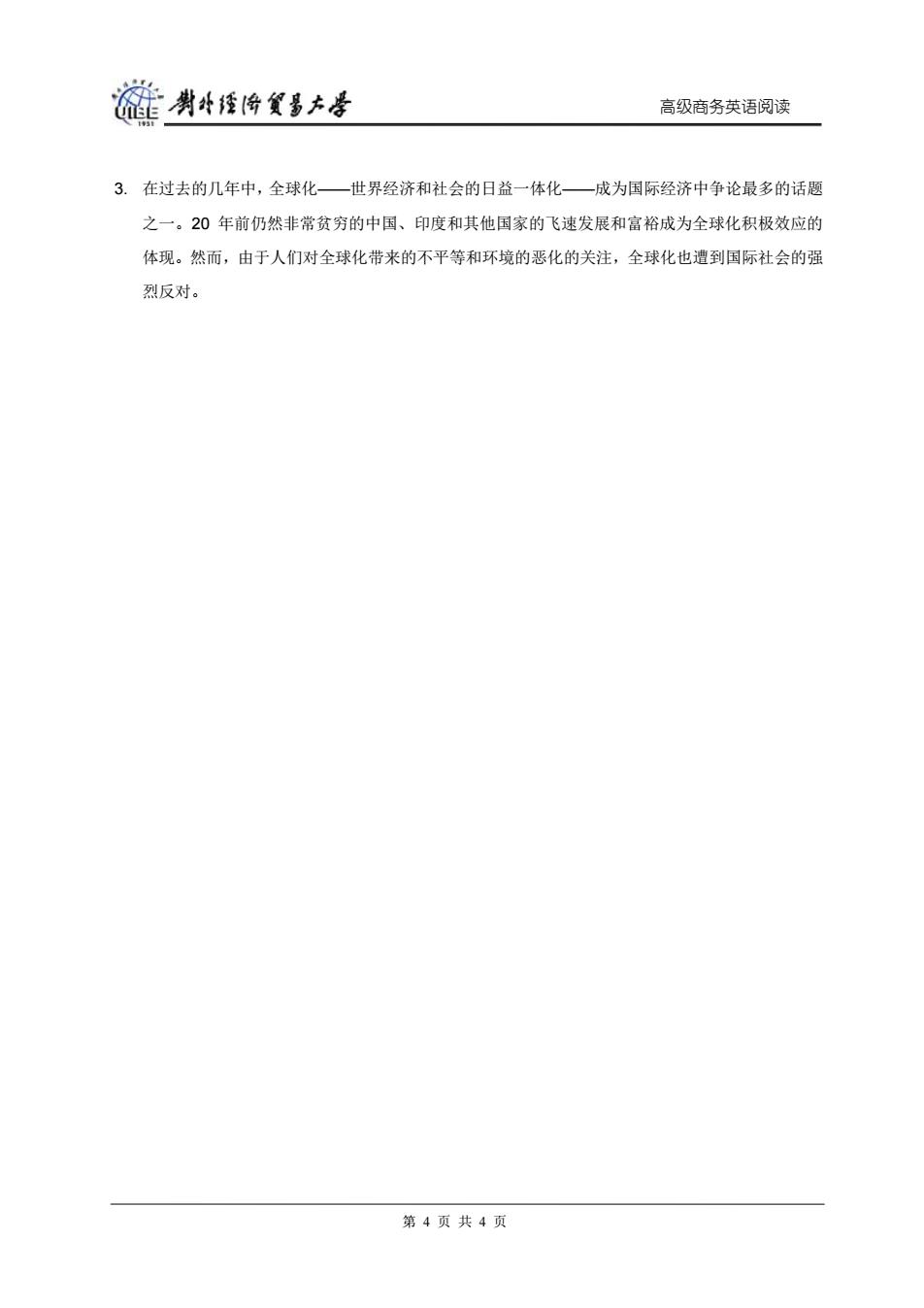
链典4矮降贸多大 高级商务英语阅读 Supplementary Exercises for Chapter 11 Is Globalization Slowing Down? . Questions on the text: 1.How do you understand "globalization"?And what might globalization change the way we live and work? 2.What are the major impacts that information technologies might exert on our life? 3.Is it contradictory to say that economic globalization is slowing down while technological globalization is going on at a rapid pace?Why not? 4.The writer says that the digital divide between developed and emerging-market countries is now more like a digital abyss.What does the writer mean? 5.Does the writer disagree that globalization increases income inequality?Why? ll.Read the following passage and choose the best sentence from A to F below to fill in each of the gaps in the passage. Last year's headlines offered grim commentary on the prospects for global integration.1) Trade ministers scaled back plans for the Free Trade Area of the Americas (FTAA), sidestepping controversies over intellectual property and investment.The United States and the European Union(EU)traded diplomatic blows over free trade and the ongoing war on terrorism. Within the EU,the Growth and Stability Pact limiting budget deficits in the euro zone effectively collapsed,and political integration sputtered as Europe's leaders failed to reach consensus on a draft constitution.2)__ Before anyone rushes to give last rites to globalization,keep in mind that we've heard it all before. In the months following the September 11,2001,terrorist attacks,pundits were predicting the end of globalization as we knew it.The porous borders that made possible the unprecedented global movement of money,goods,people,and ideas were to be encircled by barbed wire and checkpoints,bringing trade and travel to a halt.3)_ 第1页共4页
高级商务英语阅读 Supplementary Exercises for Chapter 11 Is Globalization Slowing Down? I. Questions on the text: 1. How do you understand “globalization”? And what might globalization change the way we live and work? 2. What are the major impacts that information technologies might exert on our life? 3. Is it contradictory to say that economic globalization is slowing down while technological globalization is going on at a rapid pace? Why not? 4. The writer says that the digital divide between developed and emerging-market countries is now more like a digital abyss. What does the writer mean? 5. Does the writer disagree that globalization increases income inequality? Why? II. Read the following passage and choose the best sentence from A to F below to fill in each of the gaps in the passage. Last year's headlines offered grim commentary on the prospects for global integration. 1) ________ Trade ministers scaled back plans for the Free Trade Area of the Americas (FTAA), sidestepping controversies over intellectual property and investment. The United States and the European Union (EU) traded diplomatic blows over free trade and the ongoing war on terrorism. Within the EU, the Growth and Stability Pact limiting budget deficits in the euro zone effectively collapsed, and political integration sputtered as Europe's leaders failed to reach consensus on a draft constitution. 2) ________ Before anyone rushes to give last rites to globalization, keep in mind that we've heard it all before. In the months following the September 11, 2001, terrorist attacks, pundits were predicting the end of globalization as we knew it. The porous borders that made possible the unprecedented global movement of money, goods, people, and ideas were to be encircled by barbed wire and checkpoints, bringing trade and travel to a halt. 3) ________ 第 1 页 共 4 页

碰男经将贸多大是 高级商务英语阅读 Yet,this year's edition of the A.T.Kearney/Foreign Policy Globalization Index shows that globalization endured in 2002.4)_But globalization involves far more than the ups and downs of economic cycles.That's why the A.T.Kearney/Foreign Policy Globalization Index uses several indicators spanning trade,finance,political engagement,information technology (it),and personal contact to determine the rankings of 62 countries.We found that noneconomic drivers of global integration,from travel to telephone traffic,remained remarkably resilient in 2002,while access to the Internet worldwide continued to surge.5) Globalization survived a period of considerable challenges in 2002:heightened travel alerts, stringent new security measures at airports,a major strike by dock workers at the busiest port in the United States,a string of high-profile corporate scandals in developed countries,financial market fallout from Argentina's economic unraveling,and jarring terrorist attacks in countries such as Indonesia and Kenya.6)__ A.These variables helped compensate for the weakening of international economic ties and deepened global linkages overall. B.Some doomsayers even predicted a global economic and political unraveling similar to the events preceding the First World War. C.Despite all its travails,the world was more-not less-integrated at the end of 2002 than it had ever been before. D.The World Trade Organization(WTO)meeting in Cancun,Mexico,collapsed when developing countries revolted over industrialized countries'refusal to reduce agricultural subsidies. E.To be sure,it was a difficult year for global economic linkages,as a downturn in foreign direct investment(FDI)and a sharp drop in portfolio capital flows led to the lowest level of economic integration since 1998. F.And the United Nations,perhaps the most visible symbol of multilateral cooperation,appeared immobilized as the rancorous debate over military action in Iraq unfolded. Ill.E-C Translation: 第2页共4页
高级商务英语阅读 Yet, this year's edition of the A.T. Kearney/Foreign Policy Globalization Index shows that globalization endured in 2002. 4) ________ But globalization involves far more than the ups and downs of economic cycles. That's why the A.T. Kearney/Foreign Policy Globalization Index uses several indicators spanning trade, finance, political engagement, information technology (it), and personal contact to determine the rankings of 62 countries. We found that noneconomic drivers of global integration, from travel to telephone traffic, remained remarkably resilient in 2002, while access to the Internet worldwide continued to surge. 5) ________ Globalization survived a period of considerable challenges in 2002: heightened travel alerts, stringent new security measures at airports, a major strike by dock workers at the busiest port in the United States, a string of high-profile corporate scandals in developed countries, financial market fallout from Argentina's economic unraveling, and jarring terrorist attacks in countries such as Indonesia and Kenya. 6) ________ A. These variables helped compensate for the weakening of international economic ties and deepened global linkages overall. B. Some doomsayers even predicted a global economic and political unraveling similar to the events preceding the First World War. C. Despite all its travails, the world was more—not less—integrated at the end of 2002 than it had ever been before. D. The World Trade Organization (WTO) meeting in Cancún, Mexico, collapsed when developing countries revolted over industrialized countries' refusal to reduce agricultural subsidies. E. To be sure, it was a difficult year for global economic linkages, as a downturn in foreign direct investment (FDI) and a sharp drop in portfolio capital flows led to the lowest level of economic integration since 1998. F. And the United Nations, perhaps the most visible symbol of multilateral cooperation, appeared immobilized as the rancorous debate over military action in Iraq unfolded. III. E-C Translation: 第 2 页 共 4 页

爸剥榜降餐多产孝 高级商务英语阅读 1.These findings should reinvigorate the debate over whether countries are poor and unequal because of globalization or because they are not globalized enough.Moreover,efforts to redress global inequality should be tempered with the recognition that many countries with skewed income distribution patterns,including Brazil and Nigeria,also have large populations. 2.In addition to the United States and Canada,Scandinavian countries also rank among the world's most wired nations.Thirty-nine percent of Sweden's population was online in 1998, growing to 44 percent in more recent surveys.Finland and Norway led in Internet hosts,each with more than 70 servers per 1000 inhabitants connected directly to the World Wide Web. 3. Globalization-the growing integration of economies and societies around the world-has been one of the most hotly-debated topics in international economics over the past few years. Rapid growth and poverty reduction in China,India,and other countries that were poor 20 years ago,has been a positive aspect of globalization.But globalization has also generated significant international opposition over concerns that it has increased inequality and environmental degradation. IV.Key to Exercises 1.Exercise ll 1D,2F,3B,4E,5A,6C 2.Exercise lll 1.这些研究结果会再次引起人们对一个国家的贫穷和不平等问题是否是因为全球化或者全球化的 程度不够所造成的辩论。然而,由于人们承认许多国家,包括巴西和尼日利亚这样的国家,不仅 收入分配不均,而且人口众多,因此,铲除全球范围内的不平等所作出的努力将会受到削弱。 2.除了美国和加拿大之外,斯堪的纳维亚国家也属于世界上网络覆盖率最高的国家。1998年瑞典 人的上网人数占总人口的39%,这一比例在最近的调查中增加到44%。芬兰和挪威拥有互联网 主机的数量世界领先,这两个国家每1000个居民拥有70多台联接万维网的服务器。 第3页共4页
高级商务英语阅读 1. These findings should reinvigorate the debate over whether countries are poor and unequal because of globalization or because they are not globalized enough. Moreover, efforts to redress global inequality should be tempered with the recognition that many countries with skewed income distribution patterns, including Brazil and Nigeria, also have large populations. 2. In addition to the United States and Canada, Scandinavian countries also rank among the world’s most wired nations. Thirty-nine percent of Sweden’s population was online in 1998, growing to 44 percent in more recent surveys. Finland and Norway led in Internet hosts, each with more than 70 servers per 1000 inhabitants connected directly to the World Wide Web. 3. Globalization – the growing integration of economies and societies around the world – has been one of the most hotly-debated topics in international economics over the past few years. Rapid growth and poverty reduction in China, India, and other countries that were poor 20 years ago, has been a positive aspect of globalization. But globalization has also generated significant international opposition over concerns that it has increased inequality and environmental degradation. IV. Key to Exercises 1. Exercise II 1 D, 2 F, 3 B, 4 E, 5 A, 6 C 2. Exercise III 1. 这些研究结果会再次引起人们对一个国家的贫穷和不平等问题是否是因为全球化或者全球化的 程度不够所造成的辩论。然而,由于人们承认许多国家,包括巴西和尼日利亚这样的国家,不仅 收入分配不均,而且人口众多,因此,铲除全球范围内的不平等所作出的努力将会受到削弱。 2. 除了美国和加拿大之外,斯堪的纳维亚国家也属于世界上网络覆盖率最高的国家。1998 年瑞典 人的上网人数占总人口的 39%,这一比例在最近的调查中增加到 44%。芬兰和挪威拥有互联网 主机的数量世界领先,这两个国家每 1000 个居民拥有 70 多台联接万维网的服务器。 第 3 页 共 4 页

旋剥经降贸墨去号 高级商务英语阅读 3.在过去的几年中,全球化一世界经济和社会的日益一体化一成为国际经济中争论最多的话题 之一。20年前仍然非常贫穷的中国、印度和其他国家的飞速发展和富裕成为全球化积极效应的 体现。然而,由于人们对全球化带来的不平等和环境的恶化的关注,全球化也遭到国际社会的强 烈反对。 第4页共4页
高级商务英语阅读 3. 在过去的几年中,全球化——世界经济和社会的日益一体化——成为国际经济中争论最多的话题 之一。20 年前仍然非常贫穷的中国、印度和其他国家的飞速发展和富裕成为全球化积极效应的 体现。然而,由于人们对全球化带来的不平等和环境的恶化的关注,全球化也遭到国际社会的强 烈反对。 第 4 页 共 4 页